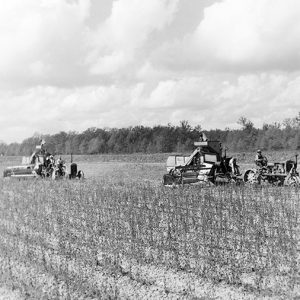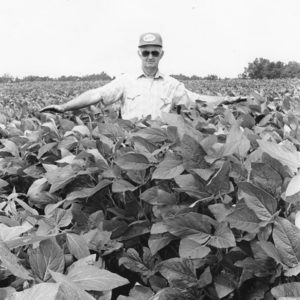calsfoundation@cals.org
Arkansas Soybean Promotion Board
Arkansas ranks in the top ten of U.S. states for soybean production. Products made from soybeans can be found in almost every aisle of the supermarket and even in most hardware stores. Soybeans, sometimes called “miracle beans,” deliver essential nutrients and high-quality protein to people and farm animals. The Arkansas Soybean Promotion Board was established to support this important industry in the state.
Act 259 of the 1971 Arkansas General Assembly established the Arkansas Soybean Promotion Board to provide producers in the state with an organization that works to improve the soybean industry. The board consists of nine unpaid soybean producers nominated by various agricultural organizations within Arkansas (including the Arkansas Farm Bureau, the Arkansas Soybean Association, the Agricultural Council of Arkansas, and Riceland) and appointed by the governor.
Soybeans originated in China and were grown as a food crop for centuries. The soybean was brought to America in 1765 by Samuel Bowen, a former East India Company sailor. In 1925, Jacob Hartz Sr. planted and harvested the first recorded crop in Arkansas. In the 1960s, Arkansas soybean producers harvested close to 2.5 million acres of soybeans, with a state yield average of twenty-one bushels per acre. Soybeans are harvested from the eastern border of Arkansas to as far west as Pope County.
Soybeans are Arkansas’s largest row crop at 3.1 million acres, accounting for more acres than rice, corn, sorghum, and wheat combined. In 2014, Arkansas producers achieved a state yield average of 49.5 bushels per acre—the highest yield ever recorded in the state up to that point. Arkansas producers harvested 3.1 million acres of soybeans in 2015, valued at more than $1.5 billion. The Arkansas 100 Bushel Club is funded by the Arkansas Soybean Promotion Board and sponsored by the Arkansas Soybean Association. This club was created in 2013 after three Arkansas soybean producers won the “Race for 100,” recording yields of more than 100 bushels per acre. In 2016, an Arkansas soybean producer made a new state yield record with 118.8 bushels per acre.
Due to advances in agricultural production, Arkansas growers produced 38.6 percent more soybeans on 32.3 fewer acres in 2016 compared to production in the 1970s. To assist Arkansas producers with environmental sustainability, the board helps fund a research program called the Arkansas Discovery Farm project. This program assists producers with implementing best management practices to conserve or improve their farmland.
Every U.S. soybean producer participates in the soy commodity checkoff, contributing at a rate of 0.5 percent of the market price per bushel, when the crop is first sold. Half of all checkoff dollars collected in Arkansas remain in the state and are controlled by the Arkansas Soybean Promotion Board with a goal of improving the sustainability and profitability of the soybean industry in Arkansas. The other half is distributed to the United Soybean Board (USB), where it is combined with funds from across the nation.
In 2015, the Arkansas Soybean Promotion Board developed an educational program, Kitchen|Fields Table Tour, to promote the relationship between the local soybean farmer and the local restaurant industry. The Kitchen|Fields Table Tour program partnered exclusively with four locally owned restaurants in the central, northeastern, and northwestern regions of the state. During each restaurant’s three-month feature, a unique dish centered around soybeans was served. Through this program, the board educated Arkansans about the impact they have on the $2 billion soybean industry.
For additional information:
Arkansas Soybean Promotion Board. http://www.themiraclebean.com/ (accessed September 8, 2020).
Arkansas Soybean Promotion Board
 Divergent Prosperity and the Arc of Reform, 1968–2022
Divergent Prosperity and the Arc of Reform, 1968–2022 Politics and Government
Politics and Government Harvesting Soybeans
Harvesting Soybeans  Soybean Field
Soybean Field 




Comments
No comments on this entry yet.